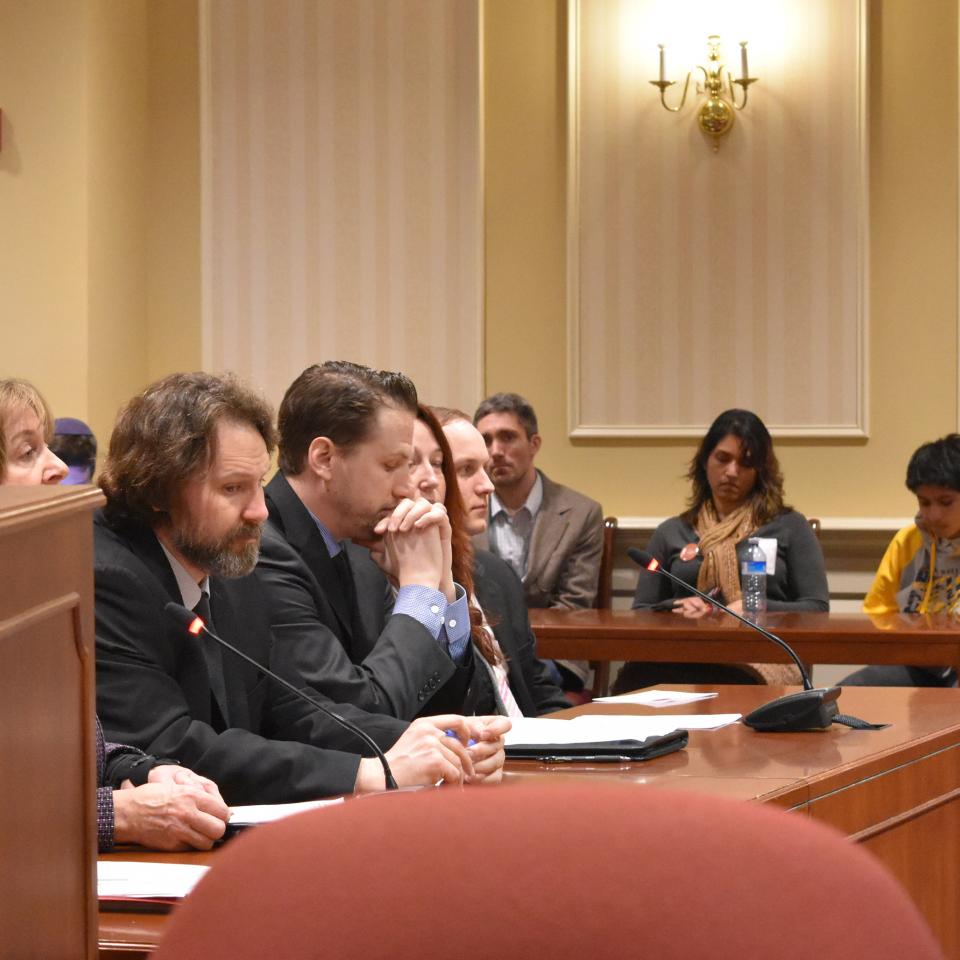Founded in 1979, the Maryland Food Bank provides six million meals a year in Maryland through its partnership with nearly 1,200 soup kitchens, pantries, shelters, and community-based organizations. Learn more about their work.


03.04.16
On the same day that hundreds of our Health Care for the Homeless community members rallied in Annapolis and lobbied for laws and policies to end homelessness, staff members and clients testified on bills that have implications for our neighbors without homes. Health Care for the Homeless Director of Community Relations Adam Schneider and Psychiatrist Ryan Stagg urged the Senate Finance Committee to support a pair of mental health bills that, if passed, could make a huge difference for vulnerable individuals statewide.
Joining a broad coalition of service providers and advocates, Schneider and Stagg urged the passage of SB 497, known as the “Keep the Door Open Act.” This bill would ensure that our state’s mental health care system is adequately funded, so that no one is denied mental health care or substance abuse treatment.
If we want to keep people from ending up on or returning to the street, Schneider told lawmakers, we need more publicly funded and readily accessible mental health resources. Our goal at Health Care for the Homeless is to help people attain stability and housing, and then “transition them into the community and on to other providers so that we can provide the best care for the most vulnerable,” he said. “Right now, that’s very, very difficult for us,” because there are so few public mental health care options for people once they’re housed and have an income.
Stagg argued that funding mental health providers isn’t just the right thing to do, it also makes financial sense: “If you take money and put it in the right places, you wind up spending a lot less on emergency room visits, a lot less on incarcerating people who don’t need to be incarcerated.”
Stagg also testified on another, related bill, SB 551, that would ensure acute mental health crisis resources statewide, starting with more walk-in centers and mobile response teams.
Drawing on his own experience at Health Care for the Homeless and in Baltimore hospital emergency rooms, Stagg told the committee that far too often, there is nowhere for someone enduring an acute mental health crisis to go. “Crises don’t stop just because there are no hospital beds available,” he explained. “We need walk-in centers. We need a plan in place for when we can’t get patients in the hospital.”
More Recent News
More than a quarter of all client visits to Health Care for the Homeless are with case managers. Presented below is one day in the life of Case Management Coordinator Adrienne Burgess-Bromley, who has been with the agency for 16 years.
Baltimore, you are rockstars! On the sunny first Saturday of November, 300+ runners, walkers, friends and volunteers took over Patterson Park for the 10th Annual Rock Your Socks 5K! We danced, cheered and enjoyed a festive race village complete with coffee, bagels, donuts, a bounce house and easy ways to engage with community partners.
Since opening Sojourner Place at Oliver in 2022, our affordable housing development team has been busy laying the groundwork for more affordable housing in Baltimore through a newly formed subsidiary under Health Care for the Homeless called the HCH Real Estate Company.



